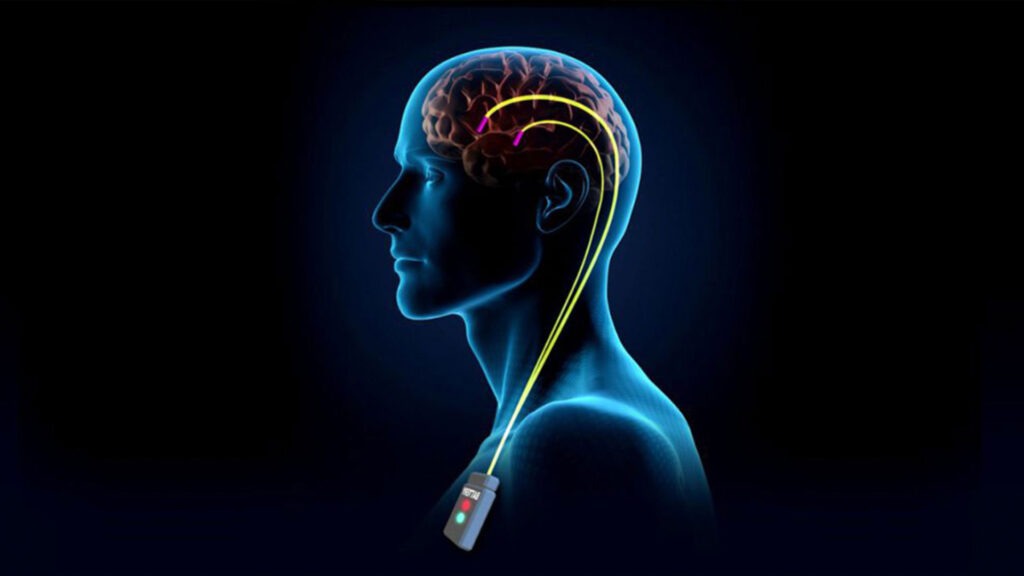
Deep Brain Stimulator Market Expected to Reach USD 2772.1 Million by 2034 at a 7.8% of CAGR, Driven by Advancements in Neurological Treatments
 Deep Brain Stimulator Market
Deep Brain Stimulator Market
The global deep brain stimulator market, valued at USD 1308.0 Million in 2024, is projected to grow steadily, reaching USD 2772.1 billion by 2034. With an anticipated CAGR of 7.8% over the next decade, the market expansion is largely driven by increasing demand for advanced treatments for neurological conditions, including Parkinson’s disease, essential tremor, and dystonia.
Key factors contributing to the growth of the deep brain stimulator market include:
- Rising Prevalence of Neurological Disorders: The growing number of patients affected by neurodegenerative and movement disorders is boosting demand for deep brain stimulation as an effective therapeutic option.
- Technological Innovations: Advances in neurostimulation technology, such as rechargeable and adaptive stimulators, are enhancing device efficacy and patient outcomes, propelling market growth.
- Expanding Applications: Deep brain stimulation (DBS) is expanding beyond traditional movement disorders, with emerging applications in psychiatric and cognitive disorders, increasing its clinical utility and adoption.
- Favorable Reimbursement Policies: Supportive healthcare policies and reimbursement structures in developed regions are making DBS treatment more accessible, further driving market growth.
- Increasing Research and Development Efforts: Extensive research on DBS efficacy and safety, as well as new device development, is anticipated to open new avenues for market expansion.
Trends in neuromodulation technology suggest that the sector experiences a growing trend towards minimally invasive surgeries, with DBS being a pivotal technology in treating neurological disorders with reduced recovery times and fewer complications.
The integration of artificial intelligence and machine learning in DBS systems is enhancing the precision and efficacy of treatments, allowing for real-time adjustments and personalized therapy.
The sector is experiencing an increase in clinical trials and research activities, driven by the potential of DBS to treat a wide range of neurological and psychiatric disorders beyond Parkinson’s disease, like depression and epilepsy.
Competition Outlook
With different strategic expansion modes adopted by organizations, the sector can be explored such that organizations can create a niche in the industry. Along with product launches, key players use mergers, acquisitions, collaborations, and partnerships to gain more space in the industry.
New entrants have less negotiating power, which affects the prospects of such key players. The collective ecosystem of new entrants and existing organizations can fuel the deep brain stimulator market value.
The following are key recent developments that have occurred in the sector
- In October 2023, Neuropace Inc. introduced RNS System Enhancements, which were intended to streamline care. This helped the firm innovate, gaining a better position in the industry.
- In April 2024, St. Jude Medical introduced a new drug called UH15-38, which can prevent individuals from lethal aftereffects of flu. This helped the organization diversify products and consolidate the position of the firm in the industry.
Leading Deep Brain Stimulator Brands
St. Jude Medical, Neuropace Inc., Boston Scientific Corporation, LivaNova PLC, Medtronic, Aleva Neurotherapeutics S.A., Nexstim, Beijing PINS Medical Co. Ltd, and SceneRay Co., Ltd. are key competitors in the ecosystem.
Grab Your Complete Report Instantly
Deep Brain Stimulator Market – Key Segments
By Product:
Single Channel and Dual Channel are key categories in the product segment.
By Application:
Depression, Pain Management, Dystonia, Parkinson’s Disease, Epilepsy, Essential tremors, and Others are key application segments of the industry.
By End User:
Hospitals, Neurology Clinics, Ambulatory Surgical Centers, and Research Centers are key end-user segments.
By Region:
North America, Latin America, Western Europe, Eastern Europe, South Asia and Pacific, East Asia, and The Middle East and Africa are the key contributing regions to the industry.
Author By:
Sabyasachi Ghosh (Associate Vice President at Future Market Insights, Inc.) holds over 12 years of experience in the Healthcare, Medical Devices, and Pharmaceutical industries. His curious and analytical nature helped him shape his career as a researcher.
Identifying key challenges faced by clients and devising robust, hypothesis-based solutions to empower them with strategic decision-making capabilities come naturally to him. His primary expertise lies in areas such as Market Entry and Expansion Strategy, Feasibility Studies, Competitive Intelligence, and Strategic Transformation.
Holding a degree in Microbiology, Sabyasachi has authored numerous publications and has been cited in journals, including The Journal of mHealth, ITN Online, and Spinal Surgery News.
About Future Market Insights (FMI)
Future Market Insights, Inc. (ESOMAR certified, recipient of the Stevie Award, and a member of the Greater New York Chamber of Commerce) offers profound insights into the driving factors that are boosting demand in the market. FMI stands as the leading global provider of market intelligence, advisory services, consulting, and events for the Packaging, Food and Beverage, Consumer Technology, Healthcare, Industrial, and Chemicals markets. With a vast team of over 400 analysts worldwide, FMI provides global, regional, and local expertise on diverse domains and industry trends across more than 110 countries.
Contact Us:
Future Market Insights Inc.
Christiana Corporate, 200 Continental Drive,
Suite 401, Newark, Delaware – 19713, USA
T: +1-347-918-3531
For Sales Enquiries: sales@futuremarketinsights.com
Website: https://www.futuremarketinsights.com
LinkedIn| Twitter| Blogs | YouTube
Editor Details
-
Company:
- MARKITWIRED
- Website:
